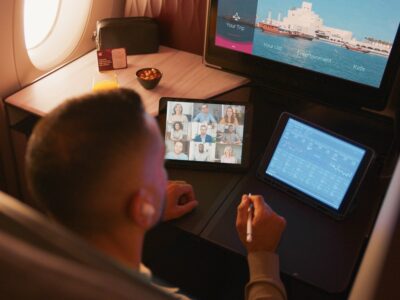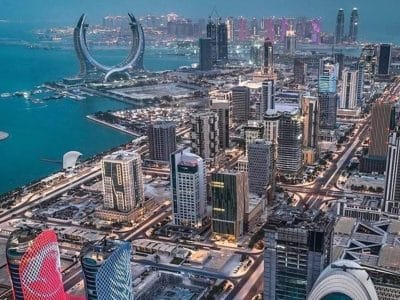For a man who heads up one of America’s largest pizza chains, Ken Calwell does not strike you as someone who eats much of the stuff.
The CEO of Papa Murphy’s is a former triathlete and self-confessed health and fitness fanatic, and his energetic approach appears to have paid off, as he has turned the Washington-based firm into an $800m per year outfit with more than 1,300 outlets across the US.
All of this is has been done with perhaps one of the most unusual approaches to fast food. Unlike larger competitors Papa John’s and Domino’s, Papa Murphy’s does not cook any of its pizza at its restaurants. After selecting the base and toppings they want, customers take their creation home and bake it themselves. The company calls this “take and bake”.
Calwell, a veteran fast food executive who has held senior roles at Pizza Hut and Domino’s, now plans to bring the concept to the Gulf in a big way. Over the next ten years, Papa Murphy’s will open 100 restaurants across the region, with about half of these in the UAE. The expansion into the Middle East marks the first overseas foray for Papa Murphy’s, with the exception of Canada, where it currently has about 14 restaurants.
“We chose the Middle East and specifically Dubai because of the very business-friendly environment here,” Calwell explains.
“What I’ve seen and researched on Dubai, it’s that people from all over the world live here, so it’s one of those places where you can get a lot of experience very quickly with a very diverse audience.”
The numbers also stack up in terms of the potential market that Papa Murphy’s, which was bought out by US-based Lee Equity Partners in 2010, will be tapping into. The UAE’s fast casual dining sector alone is expected to grow from $6.4bn in 2011 to $8.7bn by 2015, according to research firm Euromonitor, while Saudi Arabia’s market will grow to $4.5bn in the same timeframe.
Calwell says that another reason for choosing to expand into the Gulf is the similar demographic to North America, with more than 50 percent of the population estimated to be aged under 25. “Young people eat more pizza than old people, it’s just a fact. Dubai is very young and the Middle East is very young, compared to many European countries, so this was a high-priority market for those reasons.”
Analysts agree that the Gulf should be a top priority market for fast casual food firms. Michael Schaefer, head of beverages and food service at Euromonitor, says that the region’s industry is one of the fastest growing on the planet.
Article continued on next page…
“Looking at the UAE and Saudi Arabia in particular, we project real growth in total food service spending to average around 5 and 7 percent a year, respectively, between now and 2017, putting both markets comfortably in the ranks of the top ten markets with the highest forecast growth,” he says.
Papa Murphy’s Middle East operation is being handled by Mam Food Co, a Saudi conglomerate which last year secured the franchise rights to the chain. Calwell says that the company will begin with five restaurants across the UAE in 2013, before ramping up in the coming years with a flurry of outlets across Saudi Arabia, Qatar, Kuwait, Oman and Bahrain.
The company will be hiring about 2,000 staff in total to service the expansion. “In the US we have 500 different franchisees that we partner with. One of the strengths of our concept is the relationship and trust with our partners,” Calwell says.
“We want to make sure that these first stores are successful to make sure that they will have the cashflow to make it successful. I’m hopeful that our success will allow us to build even more than that.”
A dizzying selection of international fast food brands have an established presence in the UAE, from US-based McDonald’s and Pizza Hut, to Canada’s Tim Hortons, and recent entrants like South Africa’s Debonairs Pizza and New Zealand’s Burgerfuel.
Calwell disputes the suggestion that Papa Murphy’s is late to the party, or that the regional market is too saturated with such brands. He believes that the restaurant’s concept — that the pizza is made in front of the customer, similar to the sandwich chain Subway — is sufficient for Papa Murphy’s to carve out its own slice of the market. “You get to see it made in front of you, and unlike our competitors we’ll pretty much do it anyway you want to do it,” he explains. “You can have red sauce on one side and white sauce on the other, or you can do it by quarters. We’ll do it anyway you want to do it.”
One demographic that Papa Murphy’s will be aggressively targeting in the Gulf is mothers, according to Calwell. He says that this customer segment seeks both the convenience fast food offers, but also control over the ingredients their family consumes, which is why the flexibility of Papa Murphy’s appeals to them.“Moms make a lot of decisions for the families on what they’re going to eat at night. It’s particularly moms who really want it to be fresh, and they want to take the credit for cooking meals for their family,” Calwell believes.
Euromonitor’s Schaefer believes that the GCC’s fast food market is “less volatile and fad-driven” than that of fine dining, and less susceptible to economic trends, which he says leaves plenty of room for new entrants in the short to medium term. “Saturation is a possibility within the next ten years [but] it is not likely in the near term,” he explains. “Sometimes overlooked is the fact that the total population of the GCC is expected to expand more than 20 percent over the next five years, which should keep demand churning, particularly when coupled with relatively strong forecasts for economic growth.”
Papa Murphy’s says that as it does not bake its pizzas on-site, its restaurants require less capital investment, as they do not need equipment such as ovens and freezers, as well as lower operating costs for energy and maintenance. “Our dough is made fresh in the stores, it’s not shipped in from somewhere else and it’s not frozen. Some of our competitors freeze their dough, we don’t. We don’t even have freezers in our store,” Calwell points out.
Article continued on next page…
Calwell says that this allows Papa Murphy’s to undercut larger competitors like Pizza Hut and Domino’s in terms of price and also invest more in its ingredients. “I worked for Pizza Hut for eight or nine years, and I worked for Domino’s for seven years. I know the ingredients they use and I know the ingredients we use. Our ingredients cost us more money as a company, but they’re higher quality. Over time consumers come to realise that, which allows us to compete very favourably,” he claims.
The Gulf states are home to some of the world’s unhealthiest people, with a recent United Nations study highlighting the fact that more than a third of the region’s population are classified as clinically obese. What is more, a report by the International Diabetes Foundation in 2012 estimated that 20 percent of people in the Gulf suffer from the lifestyle disease.
Papa Murphy’s Calwell insists that the entrance of his restaurant into the regional market will not add to these grim statistics. He says that the US chain’s menu features healthier options prominently and that pizza can be included in a balanced diet. “None of our competitors have a line like that. Also, sometimes these products can be healthy, but they taste like cardboard. Ours doesn’t,” he believes.
Calwell takes a distinctly different tack to John Schnatter, CEO of Papa John’s, who last year told Arabian Business that GCC consumers “do not eat” healthy pizza alternatives.
According to Papa Murphy’s menu, its pizzas run the gamut from approximately 150 calories per slice for its thin crust vegetarian to a heftier 400 calories for the waist-busting ‘Big Murphy’.
Despite the prevalence of lifestyle diseases, however, Euromonitor analyst Schaefer does not believe that healthy eating will play a major role in informing GCC consumers’ dining choices in the near future. “Over the next five years, experience and quality will remain far more important demand drivers overall in the region,” he says. “What is driving fast casual growth is this idea of quality — attractive outlets, interesting, high quality food, and a relaxing overall experience.”
Calwell says that Papa Murphy’s has no immediate plans to expand beyond the Middle East into other territories around the globe, but says that this could happen at some point in the future. “Right now we’re focused on here and here alone, but as soon as this is successful we’d like to branch out,” he explains. Calwell adds that the chain had researched some other global markets, but did not specify which.
More pressing for him, Calwell insists, is emulating in the Middle East the success Papa Murphy’s has had outpunching its larger rivals in the US. “In the States, in the markets we’ve been in the longest, we are by far the most successful. Some of our competitors, where they’ve been the longest, they are not the strongest. This tells me we have a product there’s a lot of loyalty for.”








